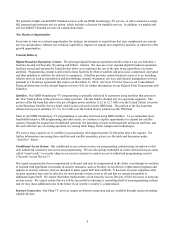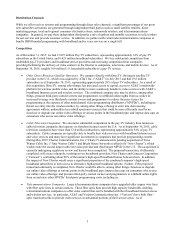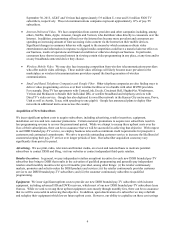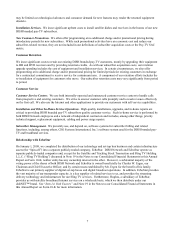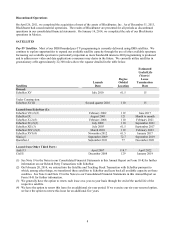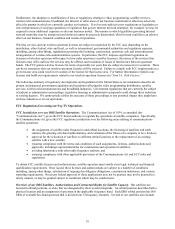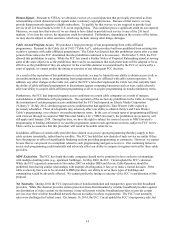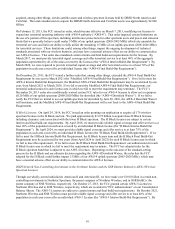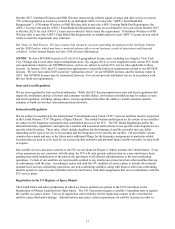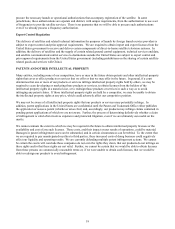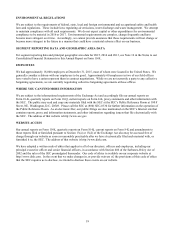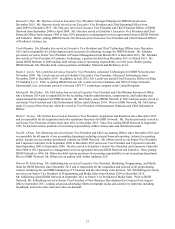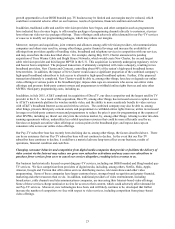Dish Network 2015 Annual Report Download - page 23
Download and view the complete annual report
Please find page 23 of the 2015 Dish Network annual report below. You can navigate through the pages in the report by either clicking on the pages listed below, or by using the keyword search tool below to find specific information within the annual report.13
incorporate all pay-TV providers into its “plug and play” rules. The cable industry and consumer electronics companies
have reached a “tru2way” commercial arrangement to resolve many of the outstanding issues in this docket. We cannot
predict whether the FCC will impose rules on our DBS operations that are based on cable system architectures or the
private cable/consumer electronics tru2way commercial arrangement. Complying with the separate security and other
“plug and play” requirements would require potentially costly modifications to our set-top boxes and operations. We
cannot predict the timing or outcome of this FCC proceeding.
In late January 2016, the FCC announced plans to initiate a notice of proposed rulemaking regarding possible new
regulations that would generally require pay-TV providers, among others, to make their video services operate on any
third-party device. Under the FCC’s proposal, consumers would have the choice of accessing cable and satellite
programming through the pay-TV operator’s products and services, or through products and services offered by a third
party. These regulations, if adopted, would have the potential to impose new costs on our DISH branded pay-TV
business by, among other things, requiring us to deploy additional hardware or software to enable our DISH branded
pay-TV service to operate with third-party devices. We cannot predict whether the FCC will adopt any new regulations
as a result of this proposed rulemaking process or the timing or outcome of this proposed rulemaking process.
Retransmission Consent. The Copyright Act generally gives satellite companies a statutory copyright license to
retransmit local broadcast channels by satellite back into the market from which they originated, subject to obtaining the
retransmission consent of local network stations that do not elect “must carry” status, as required by the Communications
Act. If we fail to reach retransmission consent agreements with such broadcasters, we cannot carry their signals. This
could have an adverse effect on our strategy to compete with cable and other satellite companies that provide local
signals. While we have been able to reach retransmission consent agreements with most of these local network stations,
from time to time there are stations with which we have not been able to reach an agreement. We cannot be sure that we
will secure these agreements or that we will secure new agreements on acceptable terms, or at all, upon the expiration of
our current retransmission consent agreements, some of which are short-term. In recent years, national broadcasters
have used their ownership of certain local broadcast stations to require us to carry additional cable programming in
exchange for retransmission consent of their local broadcast stations. These requirements may place constraints on
available capacity on our satellites for other programming. Furthermore, the rates we are charged for retransmitting local
channels have been increasing substantially and may exceed our ability to increase our prices to our customers. We may
be unable to pass these increased programming costs on to our customers, which could have a material adverse effect on
our business, financial condition and results of operations. In addition, the broadcast stations’ demands for higher rates
have resulted in more frequent negotiating impasses and programming interruptions. During these programming
interruptions, our subscribers in the affected markets lack access to popular programming and may switch to another
multichannel distributor that may be able to provide them with such programming.
The FCC is currently considering changes to its rules governing retransmission consent disputes that may provide more
guidance to the negotiating parties on good-faith negotiation requirements and improve notice to consumers in advance
of possible service disruptions. In addition, in 2015 the FCC commenced a rulemaking proceeding as required by
STELAR to review its “totality of circumstances” test for ensuring that television stations and MVPDs negotiate
retransmission consent agreements in “good faith.” STELAR also prohibits television stations from coordinating or
engaging in joint retransmission consent negotiations with any other local television stations, unless the stations are
“directly or indirectly under common de jure control,” expanding a previous FCC ruling prohibiting joint negotiations
only among the top four stations in a market. In addition, STELAR prohibits a local television station from limiting an
MVPD’s ability to carry other television signals that have been deemed by the FCC to be “significantly viewed” or to
carry any other television signal the MVPD is otherwise entitled to carry under the Communications Act, unless such
stations are “directly or indirectly under common de jure control” pursuant to FCC regulations. We cannot predict if the
FCC’s actions or these new restrictions on broadcasters will result in more effective retransmission consent negotiations.
Digital HD Carry-One, Carry-All Requirement. To provide any full-power local broadcast signal in any market, we are
required to retransmit all qualifying broadcast signals in that market (“carry-one, carry-all”), including the carriage of
full-power broadcasters’ HD signals in markets in which we elect to provide local channels in HD. The carriage of
additional HD signals on our DISH branded pay-TV service could cause us to experience significant capacity constraints
and prevent us from carrying additional popular national programs and/or carrying those national programs in HD.



